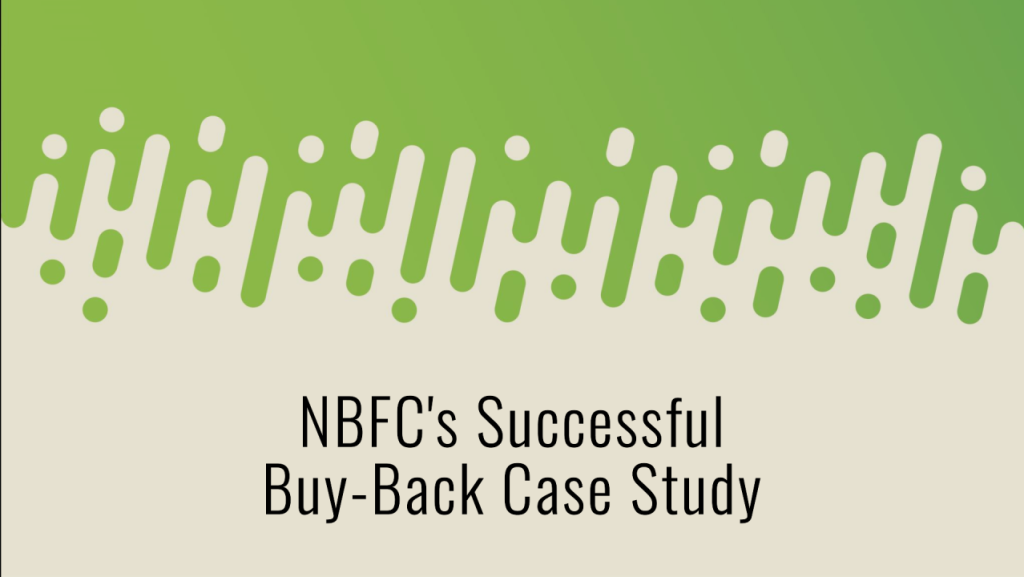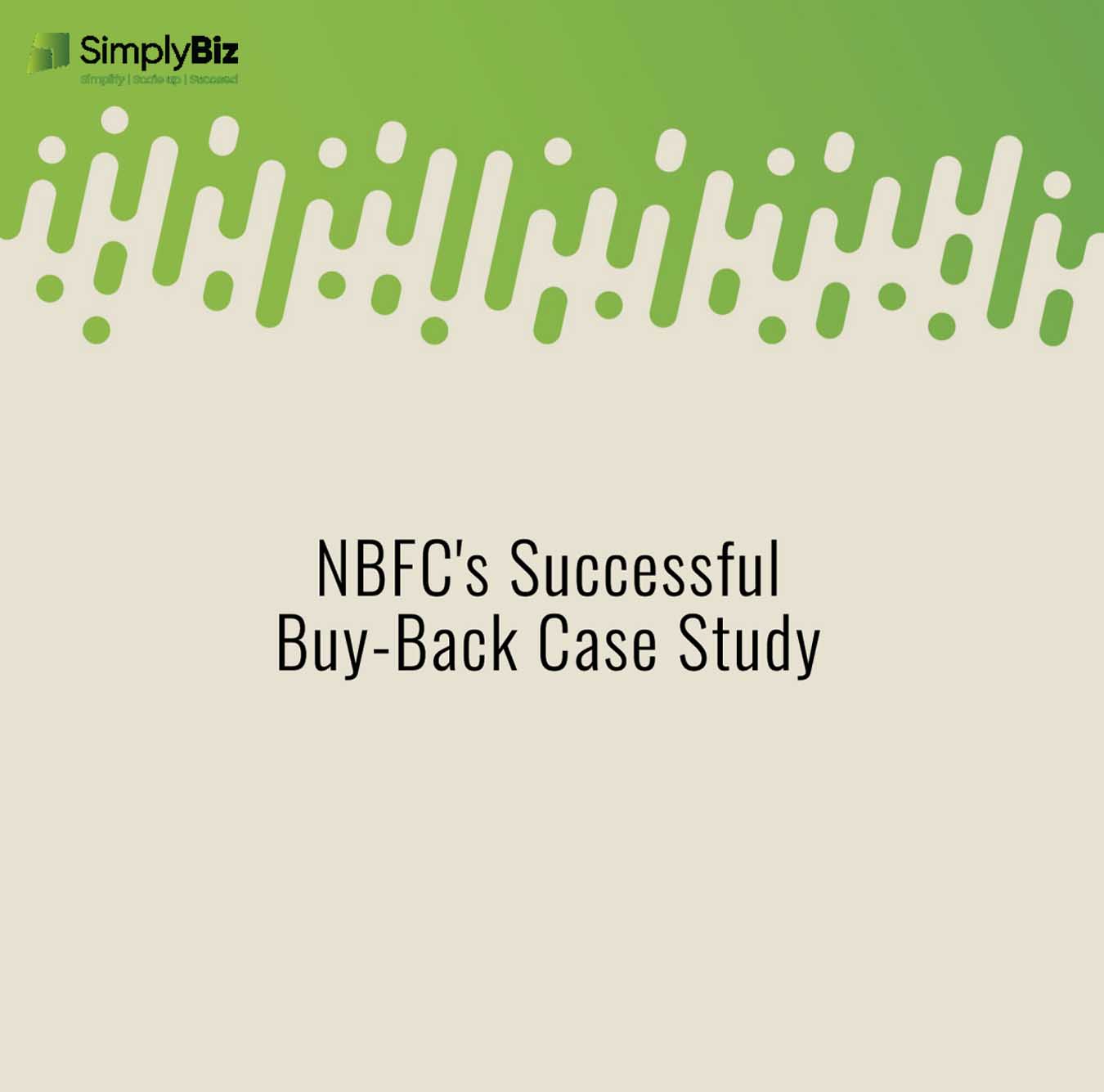NBFC's Successful buy-back case study
Contributed by: Vanaja Kaleru
Email id: vanaja@simplybiz.in
Buyback of shares is a key corporate strategy for companies aiming to reduce share capital, improve financial ratios, and boost shareholder value. It decreases the number of outstanding shares, enhancing the earnings per share (EPS) and often elevating the market value of the remaining shares.
Recently, several Indian companies like Aurobindo Pharma, Welspun Living, TTK Prestige, Bajaj Consumer Care etc., have completed share buyback programs to return value to shareholders and signal confidence in their performance.
These buyback programs often signal financial health and confidence, while providing shareholders with opportunities for direct returns.

At SimplyBiz, we recently facilitated the buy-back of equity shares for an unlisted private limited company that operates as a Non-Banking Finance Company (NBFC). A long-standing retainer client of over two decades with substantial free reserves, the company sought to execute a fast-track buy-back of its equity shares.
Our team conducted a comprehensive review of the company’s financial statements, ensuring compliance with the Companies Act, 2013. After verifying the eligibility criteria and aligning with the client’s objectives, we successfully completed the entire buy-back process within just four weeks.
This article provides an overview of the buy-back process for unlisted companies, highlighting the significant changes introduced under the Companies Act, 2013, and how they impact such transactions.
Explore the journey, key considerations, and compliance nuances involved in executing a seamless buy-back process for unlisted entities.
Legal Framework
Relevant Sections and Rules:
- Sections 68, 69 & 70 of the Companies Act, 2013
- Rule 17 of the Companies (Share Capital and Debentures) Rules, 2014
Permissible Sources for Buyback:
- Free Reserves
- Securities Premium Account
- Proceeds from new shares or securities (not of the same kind as the buyback securities)
Note: Proceeds from previous issues of the same type of securities cannot fund a buyback.
Approval Process
- Board Approval: Required for buybacks up to 10% of the paid-up equity capital and free reserves.
- Shareholders’ Approval: A special resolution is needed for buybacks exceeding 10% and up to 25% of the paid-up capital and free reserves.
Key Conditions
- Articles of Association must allow for buyback.
- Buyback cannot exceed 25% of the paid-up capital and free reserves.
- The debt-equity ratio after the buyback must not exceed 2:1.
- Shares to be bought back must be fully paid-up.
- Completion timeline: Within 1 year of Board/Special Resolution.
- The sum equal to the nominal value of the shares purchased shall be transferred to the capital redemption reserve account
Procedure
- Article of Association – Ensuring that the company’s articles of association authorize the buyback of share capital. In case of absence of relevant provisions, modify the articles in line with the provisions of the Companies Act, 2013.
- Convene a Board Meeting – If the buyback constitutes 10% or less of the company’s total paid-up equity capital and free reserves, the Board of Directors can authorize the proposal through a resolution passed during a board meeting.
- Convene a General Meeting- For any buyback exceeding the 10% threshold, the proposal must be authorized by a special resolution passed in a duly convened General Meeting.
- Filing: File a Letter of Offer in Form SH-8 with the Registrar of Companies (ROC).
- Declaration of Solvency: Submit Form SH-9, verified by an affidavit from at least two directors.
- Dispatch Offer: Send the Letter of Offer to shareholders within twenty days of filing.
- Offer Timeline: Open for a minimum of 15 days and a maximum of 30 days. However, with approval of all the members, the offer may be opened for less than fifteen days.
- Verification and Payment: Complete verification within 15 days of offer closure and fulfil payments within 7 days.
- Extinguishment: Destroy bought-back shares within 7 days of completion.
- Registers and Returns: Maintain a register in Form SH-10 and file a post-buyback return in Form SH-11 with the ROC, accompanied by a compliance certificate (Form SH-15).
- Intimation to the respective regional RBI-DNBS department
Key Restrictions
- No issuance of new shares or withdrawal of offers during the buyback period.
- Funds for buyback must not come from borrowings or previous issues of the same kind of shares or securities.
- Companies must wait at least 6 months after a buyback before issuing similar shares, except for specific cases like bonus shares or in the discharge of subsisting obligations such as conversion of instruments viz., warrants, sweat equity, esop, debentures, preference shares etc.,
Prohibitions
Buyback is not allowed if:
- The company defaults in repayment of deposits, interest, or dividends.
- Compliance issues exist with sections on Annual Returns (Sec 92), Dividend Declaration (Sec 123), or Financial Statements (Sec 129).
Remedied defaults with a lapse of 3 years are exceptions.
Conclusion:
Companies adopt buybacks for various reasons, such as capital structure optimization or projecting better stock performance. However, shareholders must evaluate the company’s fundamentals before making decisions during buyback offers.
If you are looking for support in handling a buy-back assignment, we can help you with the same. SimplyCorp is a solution that offers comprehensive and end-end management of Corporate Governance & Secretarial Compliances covering all stages of entity life cycle. If want to know more on the compliance requirements and outsource the same to us, please write to our Lead Corporate Compliances at vanaja@simplybiz.in or or our Product Head – Vaishali Vohra at the mail ID vaishali@simplybiz.in or SimplyCorp@simplyBiz.in.


Leave A Comment